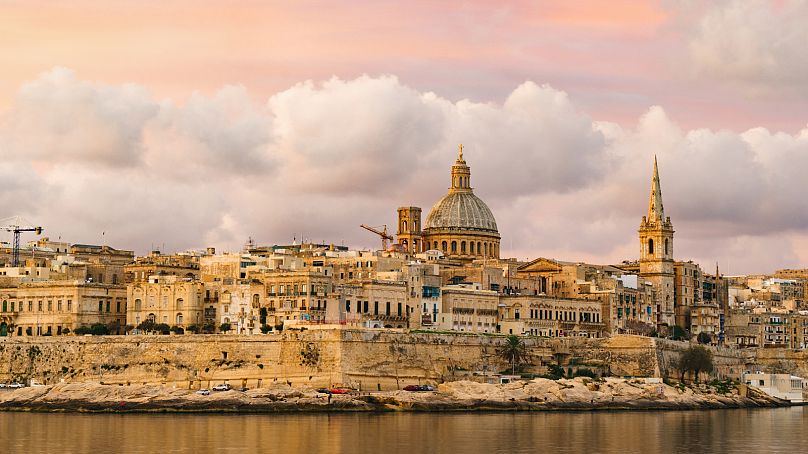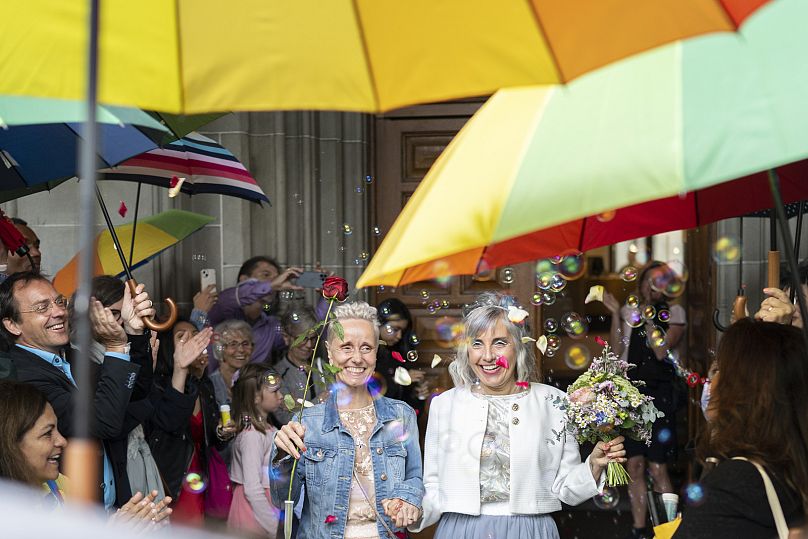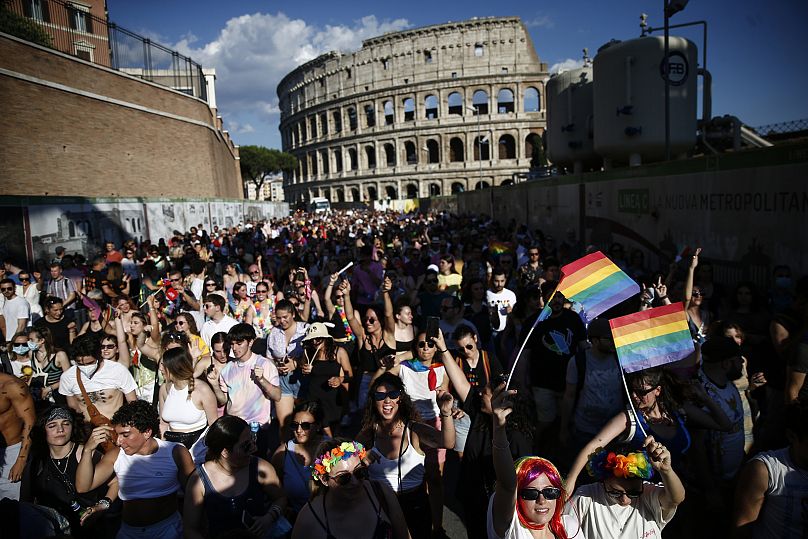On this year's International Day against Homophobia and Transphobia, Euronews Culture assesses the current state of LGBTQ rights across European countries.
Anti-LGBTQ violence is here, it’s everywhere, and it isn’t going away any time soon — at least, that’s the latest assessment made by UN Secretary-General Antonio Guterres, in a statement released on the eve of the International Day Against Homophobia and Transphobia (IDAHOT), which the world celebrates on 17 May.
 ADVERTISEMENT
ADVERTISEMENT
 ADVERTISEMENT
ADVERTISEMENT
In a stinging condemnation of enduring global anti-LGBTQ prejudice, the UN chief urged countries to end the criminalisation and systemic oppression of queer people.
"Being yourself should never be a crime," Guterres stated. "We cannot and will not move backwards."
The current state of LGBTQ rights has particularly alarmed campaigners and analysts, as a flurry of repressive policies — from Republican-sponsored bills banning drag shows in several US states to Uganda’s criminalisation of LGBTQ+ identities — seem to signal a growing hostility towards queer individuals.
But how is Europe faring in the midst of such upheavals? Euronews Culture takes a look at what the past year has meant for LGBTQ rights across the continent.
Malta, Netherlands top the rankings
Several European countries and cities have for years sat comfortably at the top of global rankings for LGBTQ rights and attitudes, and there are no signs of this changing any time soon.
In 2022, Amsterdam was pronounced the world’s most queer-friendly city by Open for Business, with the report citing the Dutch capital’s "welcoming attitudes," and heralding it a "strong global beacon" for pro-LGBTQ attitudes. London, Berlin, Stockholm and Dublin also ranked highly.
As for the latest Lesbian, Gay, Bisexual, Trans and Intersex Association (ILGA) report, Malta has once again been proclaimed Europe’s best country for LGBTQ rights, holding onto the Rainbow Europe index’s top spot for the eighth year in a row.
The Mediterranean country’s overwhelmingly Catholic population and conservative stance on certain social issues — namely, abortion — make it an unlikely candidate for Europe’s rainbow crown. Nevertheless, it has turned itself into something of a haven for queer folks.
Speaking to Euronews Culture, one young LGBTQ Maltese identifies growing secularism and strong government policies as key factors for why the small country has carved out a place for itself among the world’s most queer-friendly places.
"Religious [attitudes] are starting to decline," said Paul (his name changed upon request), a software engineer who identities as bisexual. "And the government is progressive for the community — especially for trans people recently."
Paul’s assessment is backed by the facts: Despite being one of Europe’s last remaining strongholds of religious devoutness, church attendance in Malta has plummeted from around 80% in the 1990s to 30-40% in recent years.
More marriage equality and galloping trans rights: glimmers of hope?
Over the past year, an array of European countries have taken several steps forward on various LGBT+ issues, providing some much-needed encouragement to activists across the continent.
Last July, Switzerland legalised same-sex marriage, joining a growing list of countries that allow gay couples to tie the knot.
The decision followed a referendum held in September 2021, in which just under two-thirds of voters supported "Marriage for all," as the new legal amendment had been billed.
It may come as a surprise to some that the Alpine state — frequently perceived as a bastion of high living standards — would take so much longer than many of its neighbours to legalise same-sex marriage. But it’s worth noting that Switzerland — a confederation where cantons preserve significant autonomy — has not always shined on the civil rights front.
Back in 1990, Switzerland was the last European country to fully extend voting rights to women, after a Federal Supreme Court decision approved women's suffrage in the small canton of Appenzell Innerrhoden.
Following in Switzerland’s footsteps, Slovenia also introduced gay marriage, while Croatia allowed same-sex couples to adopt.
While LGBTQ rights in Eastern Europe often make headlines for all the wrong reasons, Moldova — a deeply Orthodox country, and one of Europe’s most impoverished — has made significant progress in improving conditions for its queer citizens, jumping up 14 places in 2022’s Rainbow Index.
Trans rights have also made significant headway, after new laws were passed in Finland and Spain that allow people to change their legal gender without undergoing gruelling medical procedures and assessments.
"This is what pride in one’s country means," tweeted Spain’s equality minister last week, sharing an article on how the new law had helped boost the country’s ranking on the Rainbow Europe index.
Such gender recognition reform has been pilloried by certain conservatives and radical feminists, who decry what they consider attempts to erode sexual identity.
Nevertheless, many human rights campaigners and trans activists see such laws as indispensable steps to offering further equality and recognition to a deeply disenfranchised community.
Some ominous step-backs
As rosy a picture Europe's long list of newly acquired LGBT+ rights may paint, such advancements cannot, alas, paint over some of the widening cracks on the surface.
In Visegrád states, namely Poland and Hungary, the situation for the queer community leaves much to be desired, as LGBTQ individuals lack almost any legal protections, with few rights to spare.
Tomasz Leśniara, a Polish writer now based in Glasgow, testifies to the challenging situation for gay people like himself back at home, while also acknowledging burgeoning signs of improvement.
"As the ultra conservative Law and Justice (PiS) party has been in power since 2015, the legislative situation is just as bad as ever," Leśniara told Euronews Culture. "It is crucial for the ruling party to be changed in order for more progress to be made. However, it will be hard to achieve considering the financial aid that PiS offers, and a range of social/welfare options, payments and grants, especially for working classes."
Where Leśniara sees hope, however, is in the changing attitudes of the people themselves.
"[Polish] society is much more accepting and more comfortable with LGBT+ individuals," he said. "There is a lot of work to be done, and some areas are more accepting than others."
Further east and beyond EU borders, Russia — Europe’s "pariah" following Vladimir Putin’s invasion of Ukraine last February — has further expanded its anti-LGBT legislation, after an existing law banning "gay propaganda" for children was extended to all age groups last December.
Looking west, Italy also seems to be going through something of a rough patch.
The country has long trailed behind its western neighbours on LGBTQ rights, only introducing same-sex unions seven years ago — and it's still a long way away from taking the leap towards sanctioning same-sex marriage itself.
The election of a hard-right government last September, led by impassioned nationalist Giorgia Meloni, has not been a welcome change for many in the LGBTQ community.
Back in 2021, Meloni’s Brothers of Italy party — then part of the opposition — vehemently opposed a bill that would have enshrined anti-discrimination protections for LGBTQ people, cheering jubilantly after it was struck down by the Senate.
Meloni — whose roots lie in the country’s far-right, neo-fascist Italian Social Movement — was widely portrayed as a radical, reactionary firebrand prior to taking office. But some analysts claim her bark may have been worse than her bite, as she has tried to toe a relatively Brussels-friendly line during her first six months in office.
When it comes to LGBTQ+ rights, Meloni’s government has already signalled that its conservative stance is not budging any time soon — and has been intent to make good on that promise.
Indeed, the government has controversially tried to clamp down on same-sex couples by telling city councils to stop registering their children.
At an LGBTQ panel discussion held at Rome’s Porta Portese theatre on the eve of IDAHOT, the overall atmosphere remained upbeat and buoyant in spite of such developments. The new government’s looming shadow, nevertheless, was an unavoidable presence.
“This is a largely homophobic government,” warned journalist Francesco Lepore, one of the event’s speakers, while addressing the audience.
Another speaker, Marilena Grassadonia — a left-wing politician and lesbian activist — further called upon people to avoid complacency.
“We are living a political context in which everything is being called into question,” she stated. “But there is something important we can do — that is, taking a side”.
Some of those present, however, retained a more positive outlook.
“In the midst of everything that’s happening, perhaps we’ll see the creation of a more compact, close-knit [LGBTQ] movement,” said event organiser, Antonino Tosto.
Increasing violence and legal equality go hand-in-hand
One of the most concerning changes noticed by LGBTQ watchdogs over the past year is a surge in queerphobic hate crimes.
"In 2022 there was a stark rise in violence against LGBTI people," stated ILGA. "[N]ot only in numbers but also in the severity of that violence."
France, Belgium, the Netherlands and the UK were among the countries cited as having reported such an increase.
SOS Homophobie in France also noted that homophobic and transphobic violence are up 28% and 27%, respectively, from last year.
In a newly released press report, the EU Commission commented on such developments with deep concern.
"We have seen a rise in anti-LGBTI rhetoric, fuelled by disinformation and false narratives, often leading to violence, harassment and stigmatisation," read the statement. "We are deeply concerned about the situation – within Europe and worldwide."
ILGA’s latest study does however leave some room for optimism: increasing violence aside, the legal situation for LGBTQ people in Europe has improved overall.
"Despite intense anti-LGBTI attacks in several countries, equality is still advancing across Europe," the report stated.
"While the public discourse is becoming more polarised and violent, particularly against trans people, political determination to advance LGBTI rights is paying off."














